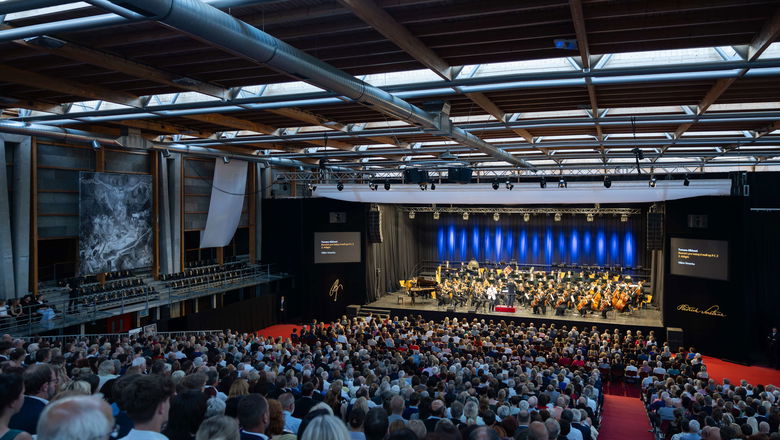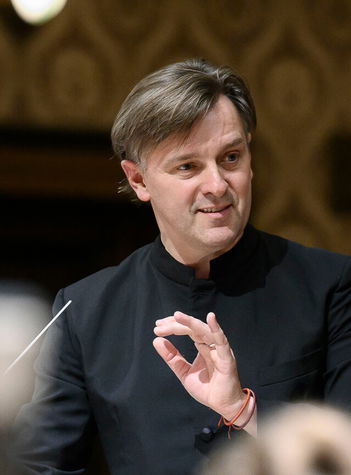1 / 6
Smetana Litomyšl Festival • The Grand Final
To celebrate the 200th anniversary of the birth of Bedřich Smetana, one cannot omit a performance of his most frequently played orchestral work—the cycle of symphonic poems Má vlast. This year, the composition will be heard at the Grand Finale of the festival bearing Smetana’s name.
Programme
Bedřich Smetana
My Country, cycle of symphonic poems
Performers
Tomáš Netopil conductor
Czech Philharmonic

To purchase online, visit the event presenter's website.
Performers
Tomáš Netopil conductor

An inspirational force, particularly in Czech music, Tomáš Netopil was Principal Guest Conductor with Czech Philharmonic from 2018-2024 performing regularly on tour and at concerts in the Rudolfinum Hall in Prague where he continues to conduct the orchestra’s New Year concerts which are live televised. In 2023/2024 season, Tomáš Netopil conducted opera productions including Janáček’s Jenůfa at the Hamburg Staatsoper and Dvořák’s Rusalka at the Prague National Theatre as well as symphonies with Frankfurt Opera Orchestra, Janáček Philharmonic Ostrava, Naples Philharmonic and Fort Worth Symphony Orchestra.
Opera productions in the 2024/2025 season include Mozart’s La Clemenza di Tito at the Grand Théâtre de Genève, Die Zauberflote with the New National Theatre Foundation, Tokyo and Don Giovanni with Oper Köln. Netopil explores a wide range of symphonic repertoire in engagements with Oslo Philharmonic, Antwerp, Kuopio and Sydney Symphony Orchestras, Hong Kong Sinfonietta and Accademia Nazionale di Santa Cecilia. This season sees a welcome return to L'Orchestre Philharmonique de Monte-Carlo as well as a debut with Orchestre National des Pays de la Loire. Another return is to Concentus Musicus Wien which builds on his work with period ensembles. As part of the Prague Spring Festival, Netopil will delight audiences with an authentic production of Mozart’s Requiem.
Seven years ago, Tomáš Netopil created the International Summer Music Academy in Kroměříž offering students both exceptional artistic tuition and the opportunity to meet and work with major international musicians. In summer 2021, in association with the Dvořák Prague Festival, the Academy established the Dvořákova Praha Youth Philharmonic with musicians from conservatories and music academies, coached by principal players of the Czech Philharmonic. Tomáš Netopil has held a close relationship with the Dvořák Prague Festival for some time and was Artist-in-Residence in 2017, opening the Festival with Essen Philharmoniker and closing the Festival with Wiener Symphoniker in Dvořák’s Te Deum.
Tomáš Netopil’s discography for Supraphon includes Janáček’s Glagolitic Mass (the first ever recording of the original 1927 version), Dvořák’s complete cello works, Martinů’s Ariane and Double Concerto, and Smetana’s Má vlast with the Prague Symphony Orchestra with whom he’ll become Chief Conductor and Music Director from 2025/2026 season. During his tenure in Essen, his releases included recordings of Suk Asrael and Mahler Symphony Nos. 2, 3 6 and 9.
From 2008-2012 Tomáš Netopil held the position of Music Director of the Prague National Theatre. He studied violin and conducting in his native Czech Republic, as well as at the Royal College of Music in Stockholm under the guidance of Professor Jorma Panula. In 2002 he won the 1st Sir Georg Solti Conductors Competition at the Alte Oper Frankfurt.
Compositions
Bedřich Smetana
My Country, cycle of symphonic poems
By the time that Smetana was in Sweden in the 1850s, he had begun to take interest in a recent musical discovery known as the symphonic poem, invented by Smetana’s mentor, the composer Franz Liszt. The symphonic poem was intended as an emphatic response to all the criticism aimed at music as an artform: according to many aestheticians, the great weakness of music was its abstractness. For this reason, composers began writing works with a concrete extramusical programme such as, for example, a story, event, or description of nature. While working in Sweden from 1856 to 1861, Smetana wrote three symphonic poems: Richard III, Hakon Jarl, and Wallenstein’s Camp. Then in he wrote respectfully to Liszt: “Consider me to be the most fervent supporter of our artistic movement, who stands for its holy truth by word and deed.”
It was not until he was back in Bohemia over a decade later that her returned to thinking about more symphonic poems. He created the extraordinary musical cycle Má vlast (My Country), a unique concept in all of music history worldwide, from 1874 to 1879. By that time, he was totally deaf. He used music to portray the myths and history of Bohemia, the country where he lived, and also his vision of the “resurrection of the Czech nation”, which was then one of the nations of the Austro-Hungarian Empire. For this very reason, Smetana’s Má vlast enjoys a unique standing in the Czech musical tradition.
The creation of any more symphonic poems by Smetana is not mentioned until 1872. In November, the music journal Hudební listy reported that Bedřich Smetana “having fully completed his great patriotic opera Libuše (…) is now moving on to larger-scale orchestral compositions titled Vyšehrad and The Moldau.” By all accounts, Smetana did not plan the whole cycle in advance; instead, it took shape over several years. In 1873, the journal Dalibor published a somewhat fanciful article, claiming that Smetana was composing “a whole cycle of symphonic poems with the overall title The Homeland and with individual sections titled Říp – Vyšehrad – The Moldau – Lipany – White Mountain etc.”, but the story was not all that far from the truth when it claimed that the composer was creating a work “based on our country’s most important moments of glory and misfortune.”
As “programme music”, Má vlast has meaning that goes beyond the world of notes, chords, or melodic lines; it involves people, things, places, and stories of the past and present. Smetana succeeded at capturing what one might call the “Czech soul” in a remarkably comprehensive way, and in Má vlast he created an amazingly timeless composition. All the political slogans of the latter half of the 19th century, when the work was written, have since inevitably become outdated (as do all political slogans ultimately), but Smetana’s music still finds a way to reach, awaken, and inspire listeners.
Smetana’s Má vlast is associated with the history of the Czech Philharmonic like few other works. It is part of a great performance tradition that dates back to 1901, when the orchestra first performed the whole cycle of symphonic poems. Since then, the Czech Philharmonic has played the work over 700 times! No other orchestra in the world has played Má vlast so often. It has given performances on workdays, weekends, and holidays, and there have even been a number of commemorative performances when Smetana’s music had a very special resonance.
1924 saw the commemoration of the 100th anniversary of Smetana’s birth, and for the occasion Václav Talich prepared a performance of Má vlast with the combined orchestras of the Czech Philharmonic and the Prague Conservatoire. Má vlast was also the first work recorded by the Czech Philharmonic with Talich on the His Master’s Voice label. Smetana’s cycle became symbolically important during the Nazi occupation and the Second World War. An incredible recording was made of Talich’s Má vlast performance in June 1939, and hearing it still sends a chill up one’s spine. They play as if their lives depended on it, and at the end, the audience sang the Czech national anthem Kde domov můj (Where My Home Is). At such times, music ceases to be a kind of cultural experience that we come to enjoy, but instead sears its way into our innermost being.
For Czech listeners, in difficult times Má vlast sounds urgent like a call to arms, but there are also moments of liberation when Smetana’s special music affirms that “the governance of your own affairs will return to you, O ye Czech people”. That is how it was in June 1945, when the Czech Philharmonic played Smetana’s cycle on Old Town Square to express thanks for the end of the war. That is how it was in May 1968, when Karel Ančerl and the orchestra opened the Prague Spring Music Festival in an atmosphere of great societal revival and liberalisation after 20 years of totalitarianism. And that was again the case in the spring of 1990, shortly after the communist regime had definitively fallen. After 42 long years of exile, the conductor Rafael Kubelík returned home. “I have fervently awaited this moment, and I believed that it would come one day. I am grateful to God, to the whole nation, to my friends, and to all of you.” Those were Kubelík’s first words upon returning to his homeland on 8 April 1990. “What Václav Havel has been able to achieve recently is not a miracle, but rather proof that there are no miracles and that in mankind there is strength that can truly move mountains.”
For nearly the entire 20th century, Smetana’s cycle was something like the exclusive property of the Czech Philharmonic and other Czech orchestras. Today those orchestras face competition over which one can only rejoice. Má vlast is a valued item in the repertoire of the Berlin Philharmonic, the Vienna Philharmonic, and the orchestras in Munich, Bamberg, Cologne, Hamburg, Madrid, Amsterdam, and Cleveland. It was heard recently at the Prague Spring Festival and at the 2022 Salzburg Festival played by Barenboim’s West-Eastern Divan Orchestra consisting of young musicians from the Middle East. Má vlast has become an international work.